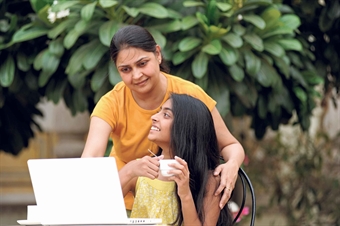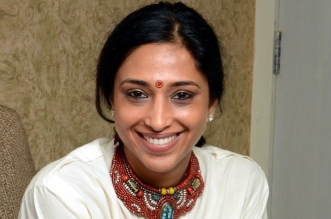
We Need to Talk
 The birds and the bees, gay marriages and divorce… there’s no easy way to bring up sensitive topics with your children, but it must be done. Henna Achhpal and Rhea Dhanbhoora talk to a few experts who tell us the right (and least awkward) way to go about it…
The birds and the bees, gay marriages and divorce… there’s no easy way to bring up sensitive topics with your children, but it must be done. Henna Achhpal and Rhea Dhanbhoora talk to a few experts who tell us the right (and least awkward) way to go about it…
Mommy, where do babies come from?” Yes, you’ve dodged the question in the past, made up some cutesy way to describe the situation or used the standard “I’ll tell you when you get older line.” Sadly, “older” catches up with most of us sooner or later. However, talking about certain issues that are sensitive or awkward is a must and it should be done before your children start picking up wrong information from television, the internet or peers. We talk to Madhavi Sheth, Counselling Psychologist at Solutions Counselling Centre and Dr. Prakriti Poddar a Personal Counsellor from Mind Over Image Consulting, to help us handle the various situations we find ourselves in as mothers to growing children…
THE BIRDS AND THE BEES
Sex is a topic that both, parents and children dread discussing. While some parents like to pretend that sex doesn’t exist, children prefer to get all their information from friends or the world wide web. However, no matter how awkward, it’s important for parents to have the ‘sex talk’ with their children.
Dr. Prakriti explains, “Times have changed and children are now exposed to sex at a much earlier age through movies, television and even music. They aren’t as curious anymore as it’s not something hidden that needs to be explored.” However, knowledge and information is not all says Dr. Prakriti, “A healthy attitude towards sex is what a parent’s goal should be. If you connect sex to love and as a means to express love, your children are more likely to grow up with a healthy attitude towards sexuality.” Discussing it earlier will benefit them greatly because they’ll get the information from you rather than an unreliable outside source. Madhavi says, “Be sure not to approach them out of the blue or when they’re feeling vulnerable. Instead make it a casual discussion and start by asking about their friends and life in general.”
GENDER ISSUES
Another important thing to keep in mind before discussing sex with your child is that the way you talk to your daughter will be different from how you approach your son regarding the topic. Madhavi says, “Sex is more emotional for girls whereas it’s more of a physical feeling for boys.” She continues, “It is best that mothers delicately discuss sex with their daughters when they hit puberty and mentally prepare them for their first menstrual cycle. Fathers should have the talk with their sons when you begin to notice that they have become more conscious of their looks and appearance.”
TOUCH ME NOT
No matter how vigilant you are with your children, certain things can go unnoticed for a long time. Often children don’t come up to parents and talk about any kind of inappropriate behaviour because they’re scared, uncomfortable or simply not aware of what’s happening. Thus, it’s extremely important for parents to encourage children to confide in them and explain to them what a “right” touch and a “wrong” touch is. Dr. Prakriti says, “You must make your children aware at an early stage, so that they don’t shut down with the burden of shame.” Make it something that’s easy and open to discuss instead of something taboo. Madhavi suggests, “When they’re young, parents must explain to their children that some parts on their body are private and they shouldn’t allow anyone to touch them there. This can be done during activities such as bathing.” Both boys and girls should be aware of the danger of predators.
HAPPY AND GAY
With society becoming more tolerant towards the LGBT community and as they express their personalities in all their glory, your child is bound to be left confused and wondering. Thus, it’s time to open your children to the possibility of gay marriages apart from the ‘natural’ marriage that they have seen with you and your husband. Dr. Prakriti says, “If sex is taught to be an expression of love, then most children won’t question a person’s gender preference.” However, Madhavi advises, “The ideal way to discuss homosexuality with your child is to let them know that there is nothing unusual about it and give them a scientific understanding rather than one filled with prejudice.”
ADOPTION ISSUES
As most other topics, it is better to talk about adoption sooner than later. Madhavi says, “It is better for your child to hear about his or her adoption from you rather than an outside source.” Dr. Prakriti explains, “From their childhood itself, positive associations should be made about adoption and how special your child is to you.” Adoption is one of your best decisions and something you are proud of, let your child know this.
THE SPLIT
Often parents stick with each other in spite of a disturbed relationship because they’re afraid of the consequences a divorce might have on their child. However Madhavi says, “I have seen many instances where children themselves have advised parents to separate due to the trauma that constant fights have on them.” She continues, “Of course it’s a difficult time and divorce takes time to accept but the mental consequences of divorce don’t depend on the age of your child. A 30-year-old man might be more traumatised about his parents getting divorced than a 17-year-old boy. It all depends on the emotional and mental stability of your child and how prepared they are for it.” Dr. Prakriti advises, “Children grasp a situation best when it is explained to them logically. Present it simply and remember to leave aside the name calling and blame game.”
DEATH AND DYING
It’s never easy to deal with the death or terminal illness of a loved one. When your child starts questioning what happened, explaining it to them is even harder. Prakriti tells us that it should be the same as dealing with a divorce, both practically as well as logically. “Displaying emotions burdens the child. If you break down in front of your child, they will involuntarily decide that they need to be stronger and will be unable to vent causing major psychological problems in the long run. Allow your child to express his or her emotions so that they are released,” she explains.
HARSH REALITIES
Gone are the days when you could let your child live in the world of Santa and tooth fairies. With exposure to television and the internet, news of harsh realities such as terrorism and mass violence are all over, making it difficult for you to shield and protect your little ones. Prakriti says an easy approach is to draw inspiration from cartoons and fairytales. “Kids watch cartoons and read stories about good and evil all the time. They understand the difference between the good guy and the bad guy. Make current affairs into story time so that they are abreast with current issues but aren’t under the notion that it’s a big bad world out there,” says Prakriti.
TALK TO ME
You’ve decided to talk about these sensitive topics with your child, but what if they don’t reciprocate the same? Madhavi says, “Discussing sensitive topics should never be sudden but rather a continuous process.” If you suddenly go up to your child and ask them what’s bothering them, they will not open up to you. Instead they might push you away in spite of your best interests. Thus, Madhavi suggests, “Whenever you find your child upset, casually ask them if you could help in anyway. If they don’t respond in a positive manner, leave them alone and don’t force yourself into their territory. If they’re ready to talk, simply listen without any judgements. Remember not to give advice unless you’re asked for it.” Dr. Prakriti says, “No child is born an uncomfortable talker. It’s the lack of communication that causes it. Start opening up to your child and they will follow suit.”
EXPERT SPEAK
“The ideal way to discuss homosexuality with your children is to let them know that there is nothing unusual about it and give them a scientific understanding rather than one filled with prejudice.”
— Madhavi Sheth, Counselling Psychologist, Solutions Counselling Centre
“If you break down in front of your child, they will decide that they need to be stronger and will be unable to vent causing psychological problems in the long run.”
— Dr. Prakriti Poddar, Personal Counsellor, Mind Over Image


 Dr. Prakriti Poddar started healing at a very early age. She started Mind Over Image in 2001 and has been Consulting with corporates and Individuals since. Her extensive experience in the fields of Consulting, Hypnotherapy and Counseling has led to hundreds of satisfied clients.
Dr. Prakriti Poddar started healing at a very early age. She started Mind Over Image in 2001 and has been Consulting with corporates and Individuals since. Her extensive experience in the fields of Consulting, Hypnotherapy and Counseling has led to hundreds of satisfied clients.


